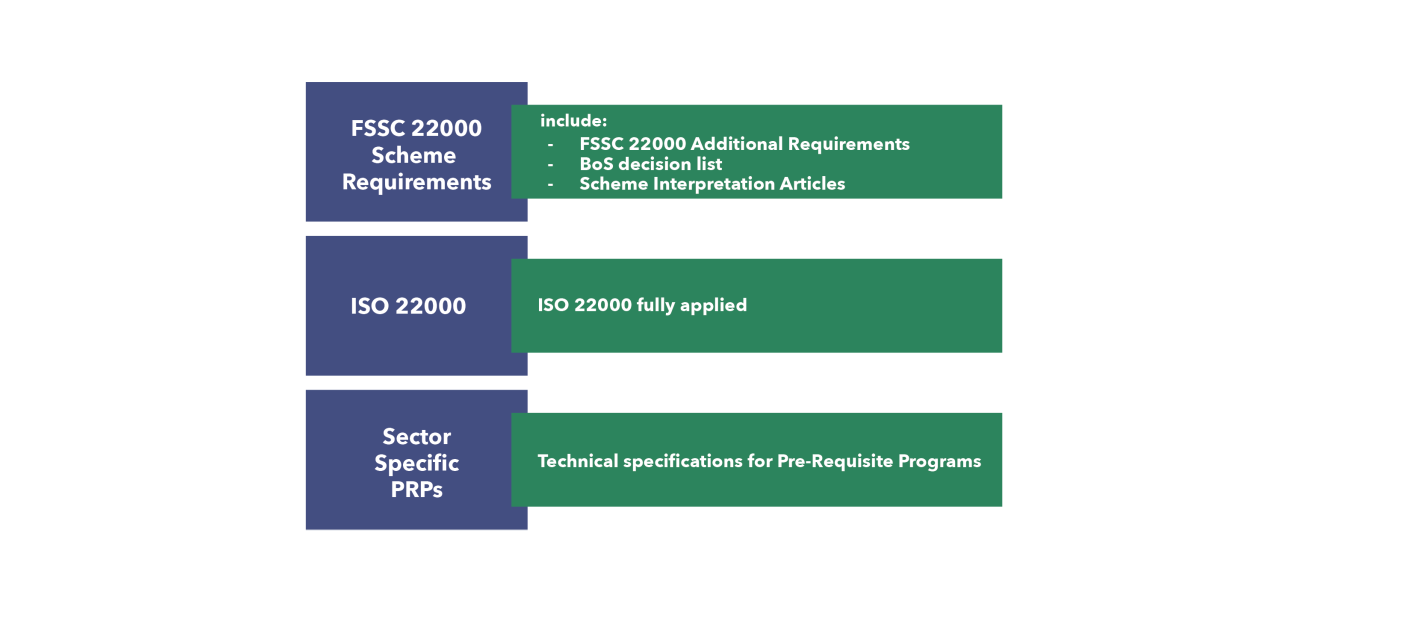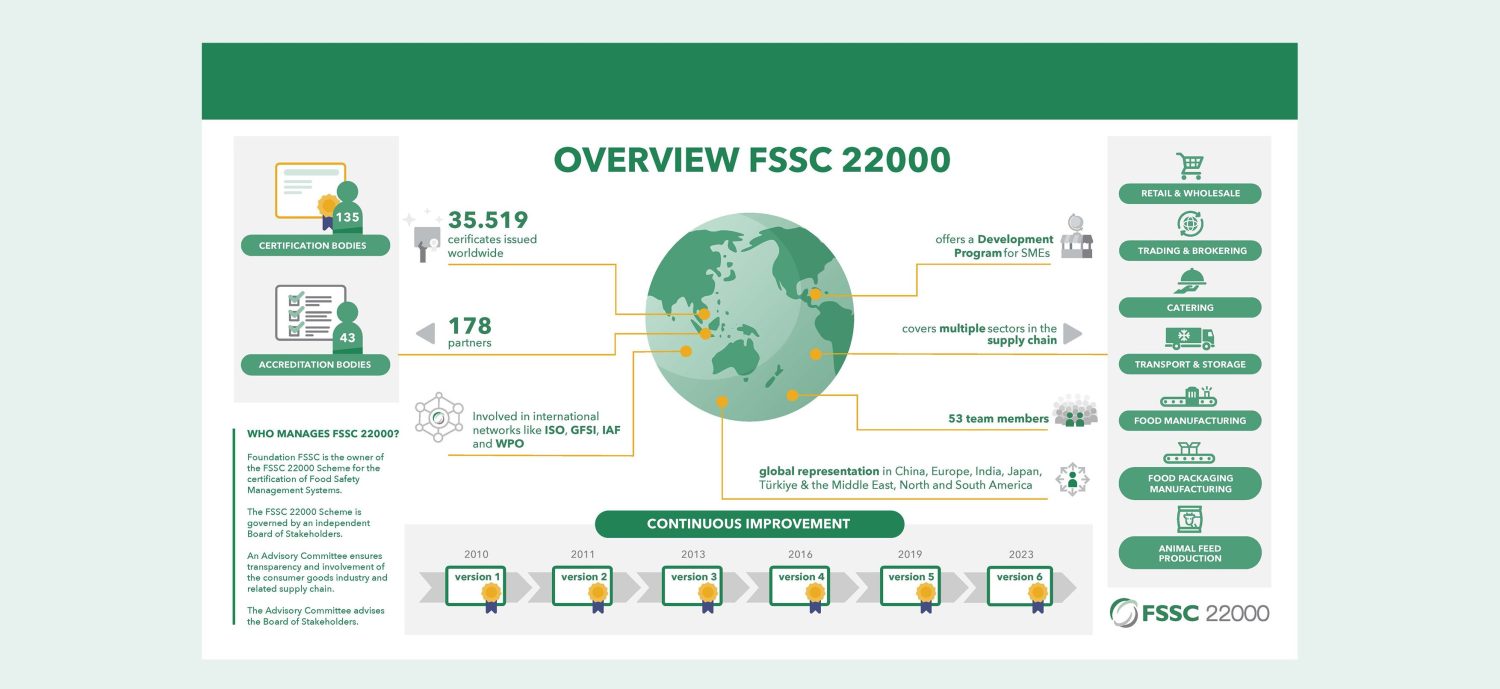Food safety management systems provide a basic framework that organizations in the food sector can apply to ensure that products and services are produced to food safety and quality standards throughout the entire supply chain. By verifying the compliance of food producers and suppliers through certificates issued by external organizations, these systems offer significant advantages to the food industry and consumers compared to traditional methods of controlling product safety and quality. FSSC 22000, the world’s leading food safety management system, provides consumer confidence and competitive advantage in the market as well as effective management of processes with its requirements based on the ISO 22000 standard. In this article, the development of third-party food safety systems and the impact of the FSSC 22000 Scheme in the sector will be discussed.
Written by Necat KIRKIL, FSSC Representative for Türkiye & the Middle East

Food Safety is everyone's responsibility
Food safety is the concept of “assurance that food will not cause adverse effects on the health of the consumer when prepared and/or consumed in accordance with its intended use” (ISO, 2018). Food safety measures implemented throughout the food supply chain play an essential role in protecting consumer health and food quality.
Without ignoring the principle that food safety is everyone’s responsibility, consumers will likely experience foodborne problems when these measures are not fulfilled correctly throughout the supply chain. Foodborne issues can result from consuming food contaminated with microbial pathogens, toxic chemicals, and physical, allergenic, or radioactive substances. Since these food hazards can occur at any point along the entire food chain, from farm to fork, they are the responsibility of all parties. In this sense, the concept of food safety is becoming increasingly important in the context of changing food habits, increasing consumer awareness, the popularization of mass catering businesses, and the globalization of the supply chain.
Difficulties arise in the implementation of internationally valid food safety regulations as a result of the fact that different laws and regulations are valid in different countries. Various organizations interpret this concept differently, and these regulations result in varying levels of food safety risks in countries (food counterfeiting-adulteration, poisoning, and contamination cases are some of the problems we face in our country).
FSMS and Third-Party Certification Programs
Especially with the increasingly globalized food supply chains covering more than one country and even continents, the importance of third-party food safety management schemes has increased to create standards at both national and international basic levels, improve global trade, and reduce trade barriers. Throughout increasingly complex supply chains, old-style approaches or the “checklist/checklist approach,” where quality officers alone are responsible for the quality, are far from ensuring safety and quality in the food sector today. In addition, the increasing awareness of consumers and their desire for quality, safe food, as well as the pressure of customers, especially retailers, on organizations, have further reinforced the orientation of organizations toward Food Safety Management Systems (FSMS). In addition to these external considerations, the need for the development of third-party specific FMS standards such as ISO 22000 and FSSC 22000 has emerged, taking into account internal considerations such as the desire to access global markets, increasing consumer satisfaction and loyalty (Nguyen and Li, 2021), sustainable growth and increasing productivity and efficiency (Table 1).
FSMS are critical tools for ensuring quality and food safety in the food sector. These systems offer a holistic, proactive, and systematic approach to ensure food safety at every stage of the food supply chain, from farm to fork, and are based on Hazard Analysis Critical Control Points (HACCP) and CODEX principles. The main features of the GGMSs include requirements such as hazard analysis, identification of critical control points, traceability, risk management, risk-based approach, food safety and quality culture, training, recall, and continuous improvement. The FSSC 22000 Scheme contains these requirements in the most ideal way and is based on the ISO 22000 Food Safety Management System standard. It is one of the most critical standards when it comes to FSMS in the world, carries all the features of ISO 22000, is a Scheme recognized by the Global Food Safety Initiative (GFSI), and has many advantages for organizations. This article will discuss third-party food safety management systems and their benefits to organizations through FSSC 22000.
Foodborne problems can result from the consumption of food contaminated with microbial pathogens, toxic chemicals, and physical, allergenic, or radioactive substances. Since these food hazards can occur at any point along the entire food chain, from farm to fork, they are the responsibility of all parties. In this sense, the concept of food safety is becoming increasingly important in the context of changing food habits, increasing consumer awareness, the popularization of mass catering businesses, and the globalization of the supply chain.
What is FSSC 22000?
The FSSC 22000 Scheme is an initiative recognized by the Global Food Safety Initiative (GFSI) that provides guidance on the food safety management systems required to ensure safety throughout the food supply chain. The Scheme has been developed in collaboration with the world’s leading food safety experts, international organizations, government authorities, academics, and suppliers to the global food industry. The FSSC Foundation is a non-profit organization that owns this Scheme (FSSC, 2024). As of April 2024, it is the world’s largest and most widely accepted GFSI-approved Scheme, with more than 35,000 Certified Organizations worldwide. These organizations include food production, packaging manufacturers, hotel chains, storage and transport organizations, animal feed manufacturers, and retailers. FSSC 22000 has a structure based on ISO 22000 but with sector-specific specifications and FSSC 22000 additional requirements (see the structure outlined in the image below).

ISO-Based Integrated Approach
By adapting quickly to changing external or internal factors, organizations increase their competitiveness and can significantly improve their chances of making a profit by increasing resource efficiency. Effective implementation of integrated management systems (FSSC 22000/ISO 22000/ISO 22000/9001/14001/45001/45001/50001) in accordance with the revised version of the new harmonized ISO standards addressing risk-based thinking is essential to improve the overall performance of the organization and thus its long-term business development (sustainable growth). Therefore, the implementation of integrated management systems in accordance with the new revised ISO standards becomes a concrete and functional tool for achieving the goal of sustainable development and circular economy (Tudoran et al., 2020). In addition, it is relatively easy for organizations already certified to ISO 22000 to transition to FSSC 22000, and the harmonized nature of FSSC 22000 will be advantageous for organizations to grasp the logic of other higher ISO standards or to transition from other ISO standards to FSSC 22000.
Flexible Risk-Based Approach
One of the criticisms of third-party schemes is that they need to be flexible enough to allow for continuous development and adaptation of the FMS to meet the dynamic requirements of its internal and external characteristics. Therefore, rather than relying solely on a hazard-oriented process-based approach, organizations need to move towards a more flexible and risk-based approach and consequently focus on minimizing food safety risks in a given situation and context. One of the features that distinguish FSSC 22000 from other GFSI schemes is the flexibility of the risk-based approach and the holistic approach to food safety that FSSC 22000 provides to organizations, including small and medium-sized enterprises (SMEs).
In this way, organizations can decide for themselves how to achieve the desired result on a risk-based basis by adapting the flexible structure to themselves rather than how they should do it with strict rules to ensure food safety. Furthermore, thanks to the management system structure of FSSC 22000, it is a business governance tool that links food safety and quality and business processes in a way that meets global consumer requirements and thus contributes to healthy and sustainable growth by helping organizations assess sectoral risks and opportunities.
Other advantages of FSSC 22000
FSSC 22000 has many different advantages over other GFSI-approved schemes. These include lower certificate fees due to its non-profit structure, the fact that it has requirements for quality and fulfillment of customer requirements as well as guaranteeing food safety, a longer certificate validity period (3 years), the ability to perform both ISO 22000 and FSSC 22000 certification with a single audit thanks to its compatibility with ISO management systems, and with this structure, it brings greater international acceptance thanks to its implementation by all major organizations in the world.
A feature that distinguishes FSSC 22000 from ISO 22000 is the strong integrity program that continuously monitors the performance of Certification Bodies and the competence of auditors, ensuring that each audit is of high quality. In addition, with Scheme Version 6, the requirements to consider Food Loss and Waste will contribute to the achievement of the United Nations Sustainable Development Goals by increasing awareness in numerous organizations along the supply chain and more efficient use of our planet’s resources while reducing carbon emissions.

References
- International Organization for Standardisation. (2018). ISO 22000:2018 Food safety management systems — Requirements for any organization in the food chain. ISO.
- Nguyen, T.T.B. and Li, D. (2021). A systematic literature review of food safety management system implementation in global supply chains. British Food Journal, ahead-of-print. doi:https://doi.org/10.1108/bfj-05-2021-0476.
- Manning, L., Luning, P.A. and Wallace, C.A. (2019) ‘The evolution and cultural framing of food safety management systems-where from and where next?’, Comprehensive Reviews in Food Science and Food Safety, 18(6), pp. 1770-1792. doi:10.1111/1541-4337.12484.
- FSSC. (2024). About us. [online] Available at: https://www.fssc.com/about/ [Accessed 3 Apr. 2024].
- Valentina Irena Tudoran and Condrea, E. (2020). The Integrated Management System – A Transition Pathway to a Sustainable and Circular Bioeconomy. Ovidius University Annals, Economic Sciences Series, (1), pp.804-810.
- FSSC. (2023). Public Register. [online] Available at: https://www.fssc.com/public-register/.



